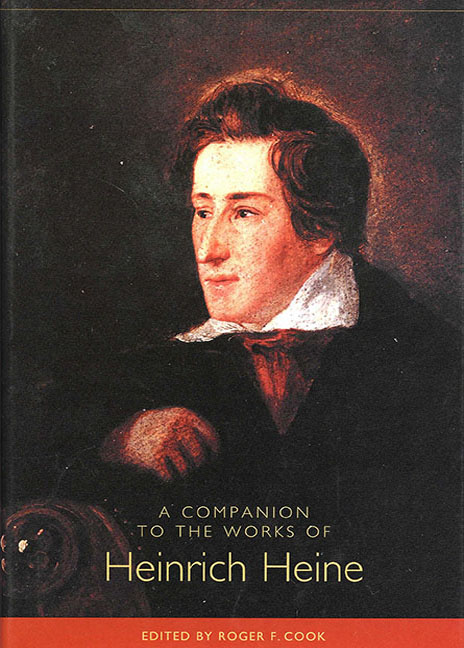Book contents
- Frontmatter
- Contents
- Acknowledgments
- Chronology of Heine's Life
- Heine's Major Works
- List of Abbreviations
- Introduction
- The Romantic Poet
- Illusions Lost and Found: The Experiential World of Heine's Buch der Lieder
- A Walk on the Wild Side: Heine's Eroticism
- The Riddle of Love: Romantic Poetry and Historical Progress
- Philosophy, History, Mythology
- Religion, Assimilation, and Jewish Culture
- Modernity: Views from the Poet's Crypt
- Reception in Germany
- Notes on the Contributors
- Index
A Walk on the Wild Side: Heine's Eroticism
from The Romantic Poet
Published online by Cambridge University Press: 29 July 2017
- Frontmatter
- Contents
- Acknowledgments
- Chronology of Heine's Life
- Heine's Major Works
- List of Abbreviations
- Introduction
- The Romantic Poet
- Illusions Lost and Found: The Experiential World of Heine's Buch der Lieder
- A Walk on the Wild Side: Heine's Eroticism
- The Riddle of Love: Romantic Poetry and Historical Progress
- Philosophy, History, Mythology
- Religion, Assimilation, and Jewish Culture
- Modernity: Views from the Poet's Crypt
- Reception in Germany
- Notes on the Contributors
- Index
Summary
Für S.
I
Sie Liebt Mich Nicht ” (HSA 20:19). Heine's exile is traditionally dated from 1831, the year of his move from Germany to Paris. In a certain sense, however, one might almost be tempted to date it from 1816, the year of his move from Düsseldorf to Hamburg. For from that year date the beginnings of his fateful, unrequited love for his cousin Amalie, whose initial yet lasting imprint is faithfully recorded here in Heine's letter to the friend and confidante of his youth, Christian Sethe. And even twelve years later, in Heine's Buch le Grand, we read: “Sie war liebenswürdig, und Er liebte Sie. Er war aber nicht liebenswürdig, und Sie liebte Ihn nicht” (DHA 6: 173). For the story, if fateful and enduring in its effects, is nonetheless quickly, almost too quickly told; and of such elemental simplicity as to make it an appropriate linguistic vehicle for the teaching of the sparest rudiments of German grammar: two bald statements, pronouns of the masculine and feminine, cases of the nominative and accusative, of subject and of object. The poor relation Heine, more tolerated than welcome in the home of his millionaire uncle Salomon, never had a chance with his alluring haute-bourgeoise cousin, a fact he was soon given unmistakably to feel. In his vicissitudes, he consoled himself, as so many before and after him, with verses: “Aber solltest Du es wohl glauben, die Muse ist mir demohngeachtet lieber als je … Ich dichte viel” (HSA 20: 21).
Indeed, it was this experience of jilted and unhappy love that was to make of Heine the poet of the Buch der Lieder (1827), to this day his most celebrated work, a book of European impact and reputation, and, throughout the nineteenth century, the lyric companion for several generations of German youth. For if the experience — of unrequited love — was commonplace enough, the poetry was not. And indeed, some subsequent critics have doubted whether the “Amalienerlebnis,” as some of Heine's first biographers were to rather extravagantly call it, was even an “experience” at all; and thus, whether the poetry of Heine's most celebrated volume can be said to have arisen from anything really felt or lived (Rose 15). “Den Talmud-kommentar dazu her!” as Franz Kafka once exclaimed in a similar Heine context.
- Type
- Chapter
- Information
- A Companion to the Works of Heinrich Heine , pp. 55 - 104Publisher: Boydell & BrewerPrint publication year: 2002

